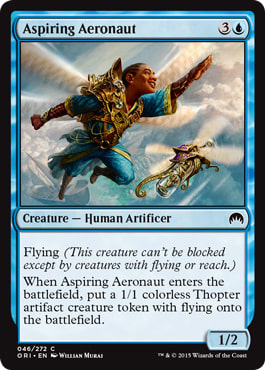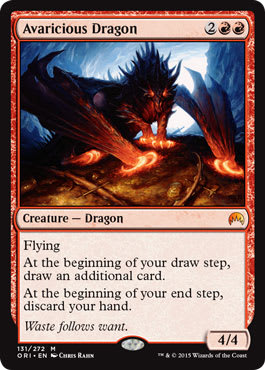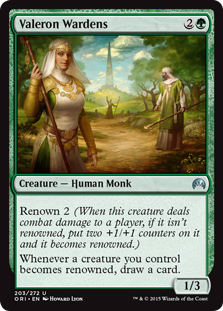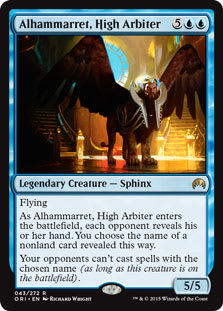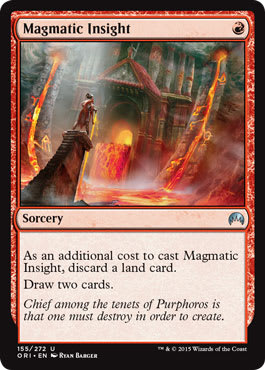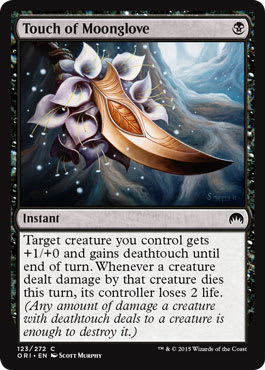It’s that time again! Another set, another healthy dose of Okra-Twinkie-Tofu. Why? It’s good for you!
For those of us who don’t know, what is O-T-T?
As explained by both Matt and Doug before me, Okra-Twinkie-Tofu takes a look at some of the not-so-well-known words found gracing the faces of Magic cards and attempts to place them into one of three food types:

Original image found here.
Magic Origins is a Writer Vorthos’s dream come true. With ten unique planes to name cards for, this set is jam-packed with interesting word choices. Let’s dive right in, shall we?
Ampryn
 I’m feeling sweet today, so let’s start things off with a sugar-filled snack. Ampryn is completely made up, and it represents one of the factions on Vryn. As we learned in Jace’s origin story “Absent Minds,” written by Kelly Digges, Vryn features massive mage-rings spanning from a large central core. Two factions, the Ampryn and the Trovians, fight for dominance of this core in order to secure its power.
I’m feeling sweet today, so let’s start things off with a sugar-filled snack. Ampryn is completely made up, and it represents one of the factions on Vryn. As we learned in Jace’s origin story “Absent Minds,” written by Kelly Digges, Vryn features massive mage-rings spanning from a large central core. Two factions, the Ampryn and the Trovians, fight for dominance of this core in order to secure its power.
An interesting note: If you look closely at the art for Ampryn Tactician, you can see that he has a map in front of him with two differently shaped figurines. One set of figurines seems to be humanoid in shape while the other set looks like unfinished mage-rings. The figurine held by the tactician (and the symbol on the chair behind him) lead us to believe that the “broken mage-ring” may be the Ampryn symbol. Also of note when looking at the art is that this tactician probably looks smashing in tights.
 | |
Despoiler
 Despoiler of Souls receives its name from the real word despoil, which means “to steal or violently remove valuable or attractive possessions from; plunder.” Knowing that, the Despoiler of Souls would be an entity that steals or violently removes the soul. I don’t know about you, but the Despoiler of Souls just got a whole lot creepier for me.
Despoiler of Souls receives its name from the real word despoil, which means “to steal or violently remove valuable or attractive possessions from; plunder.” Knowing that, the Despoiler of Souls would be an entity that steals or violently removes the soul. I don’t know about you, but the Despoiler of Souls just got a whole lot creepier for me.
Imagine, if you will, a battlefield scene showcasing the aftermath of a great war. Bodies of fallen soldiers can be seen across the field. Without warning, a horrific spider-like shade of darkness erupts from the shadow of a nearby mountain, skittering on its eight legs like a crab as it picks over the bodies of the dead. As the despoiler finds an unfortunate victim, it violently removes the soul, consuming the essence and furthering its horrific existence. Shudder!
Aeronaut
 This is in fact a real word, and it means “a traveler in a hot-air balloon, airship, or other flying craft.” What is interesting about this card is the fact that the aeronaut depicted here is not in a hot-air balloon, airship, or other flying craft. This aeronaut is piloting what looks to be a combination thopter-jetpack.
This is in fact a real word, and it means “a traveler in a hot-air balloon, airship, or other flying craft.” What is interesting about this card is the fact that the aeronaut depicted here is not in a hot-air balloon, airship, or other flying craft. This aeronaut is piloting what looks to be a combination thopter-jetpack.
Let me just stop for a minute and say that I am peanut butter and jealous of this guy’s thopter-jetpack. Much want!
As I was saying, this aeronaut is not piloting any sort of flying vessel. That is where the word aspiring comes into play. This young man dreams of one day piloting a flying airship. Perhaps he crafted this thopter-jetpack so that he could buzz alongside one ship in particular that he aspires to be the aeronaut of one day . . .
Jhessian
 This word is as fake as a Twinkie’s cream-filled center. Gideon’s first planeswalk was to the Alara shard Bant. Bant is a location filled with ritualized warfare and decorated knights on quests for honor. Bant as a shard represents a location that has access to only green, white, and blue mana. Jhess is the name given to the island nation of Bant, found along the eastern coast.
This word is as fake as a Twinkie’s cream-filled center. Gideon’s first planeswalk was to the Alara shard Bant. Bant is a location filled with ritualized warfare and decorated knights on quests for honor. Bant as a shard represents a location that has access to only green, white, and blue mana. Jhess is the name given to the island nation of Bant, found along the eastern coast.
The inhabitants of Jhess are somewhat different than the rest of Bant in that they are more freewheeling and flamboyant than the rest of the shard, something attributed to their coastal living. Jhess is famous for their navigators and the strength of their navy.
So if you were wondering what plane the Jhessian Thief was from, she is from Bant and, more specifically, the nation of Jhess. This is why she is not coated from head to toe in ritualistic armor or sigils and instead has a bit of pirate flair to her.
Avaricious
 Avaricious is another very real word meaning “having or showing an extreme greed for wealth or material gain.” Dragons in Magic are generally portrayed as flame-spewing rage monsters, so it was nice to see this alternate dragon trope showcased on a card. In literature, dragons are known not only for their fiery breath, but for their pension for hoarding treasure.
Avaricious is another very real word meaning “having or showing an extreme greed for wealth or material gain.” Dragons in Magic are generally portrayed as flame-spewing rage monsters, so it was nice to see this alternate dragon trope showcased on a card. In literature, dragons are known not only for their fiery breath, but for their pension for hoarding treasure.
As you can see in this art, the Avaricious Dragon is crouched and ready to defend its massive pile of gold. What I find really interesting about this card is the narrative it portrays through gameplay. When you control this dragon, you are compelled to take on its draconic greed.
I would really like to see this trope of draconic avarice used more in future sets. We had a taste of it on Tarkir with Silumgar and his brood, and now with Avaricious Dragon, I am hopeful that one of the ten Magic Origins planes will showcase this again sometime soon.
Eyeblight
 While eyeblight as a word is fake, the pieces it is comprised of are very real.
While eyeblight as a word is fake, the pieces it is comprised of are very real.
On the plane of Lorwyn exists a race of elves who value beauty above all else. Eyeblight is a term used by the elves that means “a creature judged ugly by elvish standards.” The title was used for those elves who were scarred in battle or those whose beauty had faded in old age. The elves would also automatically treat most of the other races as eyeblights.
The word blight has a few different definitions that all play into how Lorwyn elves may look at something they consider ugly, but most notably, blight means “a thing that spoils or damages something.” When combined with eye, the word eyebright can be interpreted as “something that can spoil or cause damage to the eyes.”
Eyeblights are so hated, so disgusting to the elves of Lorwyn, that the elves wish to not even look upon the eyeblight’s ugliness.
Valeron
 Valeron is a totally made-up word that, like Jhess before it, is used to name yet another location on Bant. The nation of Valeron lies along Bant’s southern coast and is famous for its horses and cavalry. While they cannot challenge their Jhessian rivals on the open sea, the strength of Valeron cavalry gives them a fighting chance against the opposing nation.
Valeron is a totally made-up word that, like Jhess before it, is used to name yet another location on Bant. The nation of Valeron lies along Bant’s southern coast and is famous for its horses and cavalry. While they cannot challenge their Jhessian rivals on the open sea, the strength of Valeron cavalry gives them a fighting chance against the opposing nation.
Valeron as a word has phonetic similarities to the word valor, meaning “great courage in the face of danger, especially in battle.” The similarity in sound helps guide our brains in the right direction when thinking about Valeron, allowing us to easily to imagine members of this nation riding horseback across the savannah in hopes of bringing honor to their homeland through ritualized combat.
Something interesting of note is the use of an obelisk—or stele, as they are called on Bant—in the background. These massive obelisks dot the countryside and are inscribed with ancient pictograms. It is common for individuals seeking enlightenment to make pilgrimages to these steles.
Arbiter
 Kelly Digges’s story also introduced us to the mighty sphinx Alhammarret. Alhammarret served as Jace’s tutor and mentor for years while using Jace as a tool in his work as an arbiter between the Ampryn and Trovian nations.
Kelly Digges’s story also introduced us to the mighty sphinx Alhammarret. Alhammarret served as Jace’s tutor and mentor for years while using Jace as a tool in his work as an arbiter between the Ampryn and Trovian nations.
The word arbiter is a real word that can mean either “a person who settles a dispute or has ultimate authority in a matter” or “a person whose views or actions have great influence over trends in social behavior.”
In the story, Alhammarret puts himself in a seat of power by using Jace to obtain valuable information from both the Ampryn and Trovian battlefronts and then selling that information to the opposing side. Careful to never allow one side in particular to obtain a large advantage over the other, Alhammarret ensures that there will always be war and that money will always be flowing steadily into his coffers.
In secretly controlling Vryn’s state of affairs, Alhammarret is affecting the social status of many Vryn inhabitants. By creating a constant state of war, Alhammarret has inevitably created a society that is centralized around the conflict.
Magmatic
 The word magmatic comes from the real word magma, meaning “hot fluid material below or within the earth's crust” and the Greek suffix -tic, which is used in the formation of an adjective from a noun. Magmatic is being used here to describe a type of insight being employed by an oracle of Theros, the Ancient Greece–inspired plane.
The word magmatic comes from the real word magma, meaning “hot fluid material below or within the earth's crust” and the Greek suffix -tic, which is used in the formation of an adjective from a noun. Magmatic is being used here to describe a type of insight being employed by an oracle of Theros, the Ancient Greece–inspired plane.
If you look closely at the art, the magma shown pouring forth from the mountain is flowing down predefined channels that branch off into different symbols. As the magma makes its way down the channel, it spills out into some of these symbols and spells out a message, serving as a form of prophecy or information for the oracle. For those Theros fans out there, this piece offers interesting insight into the written language (possibly individual letters) employed by Theros’s literate inhabitants.
Moonglove
 Double-dose of tofu coming at your face! Another word in the Lorwyn elf vernacular, moonglove is a fake word made up of very real parts that is used to describe the potent poison employed by the elves.
Double-dose of tofu coming at your face! Another word in the Lorwyn elf vernacular, moonglove is a fake word made up of very real parts that is used to describe the potent poison employed by the elves.
Moonglove Extract is a substance cultivated from the moonglove flowers found native to Lorwyn’s forests. From the Morningtide card Blightsoil Druid, it is implied that moonglove is either found or grown in soil fertilized by dead creatures.
Moonglove’s name is interesting in that neither of the words used to create it makes you think of something poisonous. When used as a noun, the word moon obviously refers to a celestial satellite orbiting a planet. As a verb, however, it can mean “to behave or move in a listless and aimless manner.” Maybe when an individual is under the effects of moonglove poisoning, that individual will act in a similar fashion . . .
As a final note, my absolute favorite use of moonglove in Magic actually appears in a different card in Magic Origins. If you look closely at the art for Gilt-Leaf Winnower, you can see that the bottom of her quiver is actually glass and is filled with moonglove, allowing her arrows to be freshly coated in the poison and ready to end the lives of any unsuspecting eyeblights.
That’s all the time I have for today. I hope you enjoyed this installment of Okra-Twinkie-Tofu, and until next time, may all your experiences with Magic taste just as good.
-Ant
















